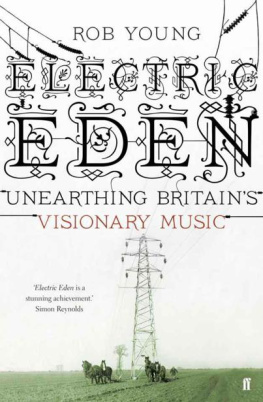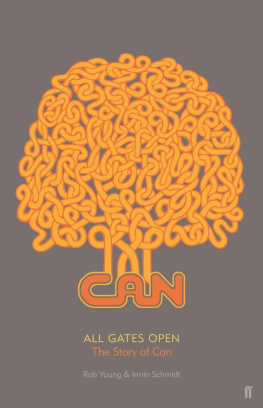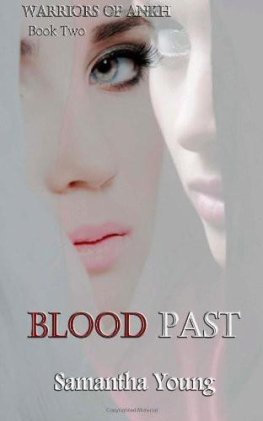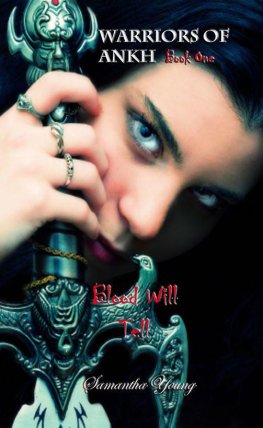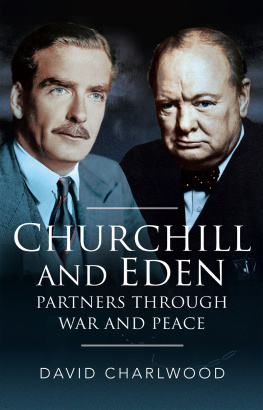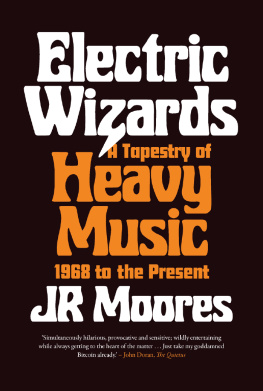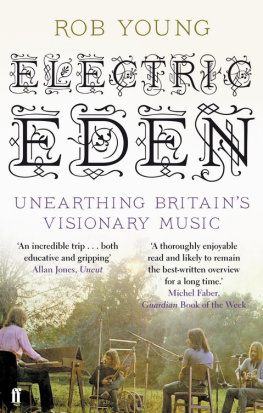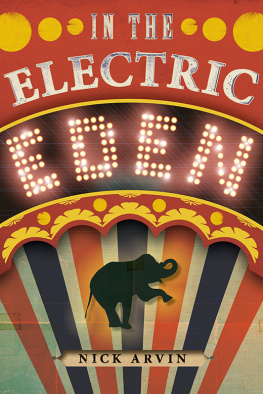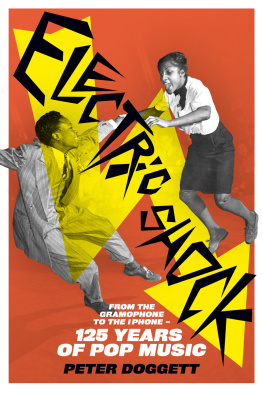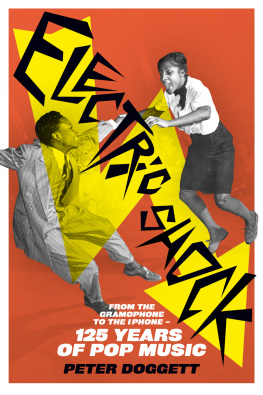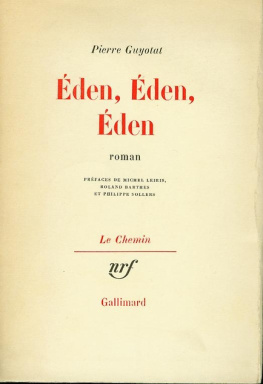Rob Young - Electric Eden: Unearthing Britains Visionary Music
Here you can read online Rob Young - Electric Eden: Unearthing Britains Visionary Music full text of the book (entire story) in english for free. Download pdf and epub, get meaning, cover and reviews about this ebook. year: 2010, publisher: Faber and Faber, genre: Non-fiction. Description of the work, (preface) as well as reviews are available. Best literature library LitArk.com created for fans of good reading and offers a wide selection of genres:
Romance novel
Science fiction
Adventure
Detective
Science
History
Home and family
Prose
Art
Politics
Computer
Non-fiction
Religion
Business
Children
Humor
Choose a favorite category and find really read worthwhile books. Enjoy immersion in the world of imagination, feel the emotions of the characters or learn something new for yourself, make an fascinating discovery.
- Book:Electric Eden: Unearthing Britains Visionary Music
- Author:
- Publisher:Faber and Faber
- Genre:
- Year:2010
- Rating:4 / 5
- Favourites:Add to favourites
- Your mark:
- 80
- 1
- 2
- 3
- 4
- 5
Electric Eden: Unearthing Britains Visionary Music: summary, description and annotation
We offer to read an annotation, description, summary or preface (depends on what the author of the book "Electric Eden: Unearthing Britains Visionary Music" wrote himself). If you haven't found the necessary information about the book — write in the comments, we will try to find it.
Electric Eden: Unearthing Britains Visionary Music — read online for free the complete book (whole text) full work
Below is the text of the book, divided by pages. System saving the place of the last page read, allows you to conveniently read the book "Electric Eden: Unearthing Britains Visionary Music" online for free, without having to search again every time where you left off. Put a bookmark, and you can go to the page where you finished reading at any time.
Font size:
Interval:
Bookmark:
Unearthing Britains Visionary Music

Rob Young

CALIBAN : Be not afeard. The isle is full of noises,
Sounds, and sweet airs, that give delight, and hurt not.
Sometimes a thousand twangling instruments
Will hum about mine ears; and sometimes voices,
That, if I then had wakd after long sleep,
Will make me sleep again; and then, in dreaming,
The clouds methought would open and show riches
Ready to drop upon me, that, when I wakd,
I cried to dream again.
William Shakespeare, The Tempest (161011)
The Nature of my Work is Visionary or Imaginative; it is an Endeavour to Restore what the Ancients calld the Golden Age.
William Blake, A Vision of the Last Judgment (1810)
PRELUDE
He rises and begins to round
He drops the silver chain of sound,
Of many links without a break
George Meredith, The Lark Ascending (1895)
As I rode out on a hot, bright, early-May day of birdsong and blossom, cycling over Londons Blackfriars Bridge in the early evening, with the dazzling sky vaulting above the silver chain of the Thames, it felt as though the wheel of the year had decisively rolled forwards on its compulsive journey from spring to summer. It had been a day for forward planning, daydreaming, letting it all hang out. Almost in defiance of the light, I was on my way to a place where the murk was king. Glancing to my right as I sped across the bridge, I could see my destination: the BFI Cinema, a recently refitted extension to the Southbanks post-war brick-and-concrete palace of culture.
The screening was a specially conceived, one-off event, co-organised by the British Film Institute and the English Folk Dance and Song Society. A kinetic parade of films and fragments culled from their joint archives: artless step-dancers and toothless drinkers in Norfolk and Suffolk pubs; the whirling, randy Obby Oss of Padstow in Cornwall, filmed in mesmerising Technicolor in the early 1950s by Alan Lomax and Peter Kennedy; an episode of a long-forgotten 1980s Channel Four documentary series, The Future of Things Past , catching the nations superstitions and unaccountable rituals before they are lost altogether to the digital age. Theres a brutality to much of them: the smashed limbs and dislocated spines of the cheese-rollers; the tortuous, sweaty ordeal of the Scottish Burryman, plastered all day with prickly burrs; the heat rashes suffered by carriers of blazing tar barrels at Lewes each November. A world, a Britain, vanished and foreign to all but the eldest gathered in tonights audience. The local and parochial made strange. Customs to which few, nowadays, are actually accustomed at all.
And then the projection screen becomes a window on an even more distant past. For heres the only known moving footage of Cecil Sharp, the folklorist and collector indelibly associated with the origins of the past centurys folk revival, skipping and twirling and enjoying a merry roister-doister with his assistants, Maud and Helen Karpeles, and the moustachioed George Butterworth, the English composer of pastoral music. Shot in 1912, their country dances and morris exercises are divided into short segments of film, totalling no more than five minutes. The footage flickers, blinks: almost breaks down into its constituent still frames. These images, held for decades deep in the archive rooms of Cecil Sharp House, are preserved on Kinora spools, a long-dead motion-picture medium. The Kinora was the British adaptation of the Lumire brothers pioneering cinmatographe. Each spool was effectively a paper or celluloid flick book, bound onto a wheel and whirled through a lightbox at approximately twelve frames per second. Until the Kinora factory burned down in 1914, this primitive projector was a popular form of high-tech Edwardian home entertainment.
The Kinora spools are silent, of course. Filmed two years before the outbreak of the First World War, they date from long before the advent of the film soundtrack. In 1982, financed by a grant from the Sheffield Morris Ring, they were transferred faithfully to film stock, simply to prolong their life and to extend it beyond the extinct Kinora device. Its a reminder that Cecil Sharp was a creature of the pre-phonographic era: while his contemporary Percy Grainger hauled a cumbersome wax-cylinder recording device around the English countryside to record village labourers reciting old folk songs, Sharps own song-collecting was all transcribed by hand in notebooks. But Butterworth, Sharp and the Karpeles sisters must have been dancing to something on the day these images were preserved. So, here at the BFI, the events curators have arranged for a fiddle player, Laurel Swift, to stand beside the screen and play jigs that match the dance moves. It only lasts three minutes at most, but theres something about this recital that triggers an indescribable reverie, as music present stretches through the screens shining portal to touch, however briefly, a set of actions nearly a century old. Theres Sharp, in his specs and loose-fitting flannel suit, prancing in this corner of a garden with abandoned, joyous innocence. Its a full eighteen years before the posthumous building of the house that still bears his name and contains his legacy. And heres vigorous, twenty-nine-year-old Butterworth, composer of English idylls, songs romantic and rueful, a year away from completing his rich orchestral tapestry of folk tunes, The Banks of Green Willow . In four years time, his blazered torso and jigging, cricket-trousered legs will be prone and lifeless in the mud of the Somme. But they dance as if the music from the fiddle in front of us, alive and resonant, is bubbling just out of camera range in this secret garden. The illusion becomes absolute, to the point where it is unclear whether the music is driving the picture, or the image is guiding the music. Perhaps, I find myself thinking, this is the nearest thing to time travel its possible to experience. This alchemy of live music and ancient film creates a conduit, a wormhole, a charmed shortcut through the huge block of elapsed time. In this moment, I feel like a guest in the Edenic corner of England depicted in these historic vignettes. And conversely, the two-dimensional dancers momentarily become guests in our own time.
And then the lights go up.

A film still from the only existing footage of folklorist Cecil Sharp (left), performing a country dance with Maud Karpeles, Helen Karpeles and George Butterworth, 1912.
* * *
It was music that cast that magic spell, dispersing time for an instant in the cinema gloom. One of the germinal ideas for this book was to locate and understand an undercurrent of music in Britain that, to my ears at least, is concerned at a root, instinctive level with a form of imaginative time travel. A significant portion of Britains cultural identity is built on a succession of golden ages. The medieval Land of Cockayne was a land of plenty and laziness, balm to the oppressed feudal labourer. Gerrard Winstanley, the activist of the English Revolution, reclaimed common land as a slice of God-given Paradise for his Digger comrades. William Blake cast his visionary faculties back to a pre-lapsarian era in which none of his present woes industrialism, poverty, urban blight existed. The early twentieth century saw the salvage of the Tudor and Elizabethan eras, recast as Merrie England, a perpetual springtime of courtliness, artistic treasures and clearly stratified society. In my own time, the nostalgia industry operates at fever pitch, often promoting an anachronistic hybrid of artefacts from both my grandparents and my parents generations Boys Own adventure stories, vintage confectionery, Regency costume dramas as well as my own youthful memories of the 1970s.
Font size:
Interval:
Bookmark:
Similar books «Electric Eden: Unearthing Britains Visionary Music»
Look at similar books to Electric Eden: Unearthing Britains Visionary Music. We have selected literature similar in name and meaning in the hope of providing readers with more options to find new, interesting, not yet read works.
Discussion, reviews of the book Electric Eden: Unearthing Britains Visionary Music and just readers' own opinions. Leave your comments, write what you think about the work, its meaning or the main characters. Specify what exactly you liked and what you didn't like, and why you think so.

